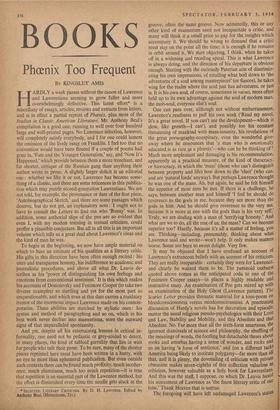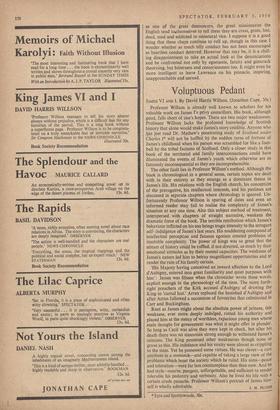BOOKS
Phoenix Too Frequent
BY KINGSLEY AMIS HARDLY a week passes without the canon of Lawrence and Lawrentiana seeming to grow fuller and more overwhelmingly definitive. This latest effort* is a miscellany of essays, articles, reviews and extracts from letters, and is in effect a partial reprint of Phoenix, plus most of the Studies in Classic American Literature. Mr. Anthony Beal's compilation is a good one, running to well over four hundred large and well-printed pages. No Lawrence selection, however, will completely satisfy everybody, and I for one could lament the omission of the lively essay on Franklin. I feel too that no convention would have been flouted if a couple of poems had gone in, 'Fate and the Younger Generation,' say, and 'Now It's Happened,' which provide between them a more trenchant, and far shorter, critique of the Russian gang than anything their author wrote in prose. A slightly larger deficit is an editorial one: whether we like it or not, Lawrence has become some- thing of a classic, and there are some reticences in this publica- tion which may puzzle second-generation Lawrentians. We are not told, for example, the provenance or date of the first piece, `Autobiographical Sketch,' and there are some passages which deserve, but do not get, an explanatory note: I ought not to have to consult the Letters to find out who 'Bunny' was. In addition, some authorial slips of the pen are so evident that even I, with my modest training in textual criticism, could proffer a plausible conjecture. But all in all this is an important volume which tells us a great deal about Lawrence's ideas and the kind of man he was.
To begin at the beginning, we now have ample material on which to base an estimate of his qualities as a literary critic. His gifts in this direction have been often enough recited : his utter and transparent honesty, his indifference to academic and journalistic procedures, and above all what Dr. Leavis de- scribes as his 'power of distinguishing his own feelings and emotions from conventional sentiment.' It is this which makes his accounts of Dostoievsky and Fenimore Cooper (to take two diverse examples) so startling and yet for the most part so unquestionable, and which even at this date carries a residuary tremor of the enormous impact Lawrence made on his contem- poraries. These abilities are matched by stylistic ones : his syntax and method of paragraphing and so on, which in his best work never decline into mannerisms, were the outward signs of that unparalleled spontaneity.
And yet, despite all his entertaining lessons in critical in- formality, one need not be pedantic or grey-souled to detect, in many places, the kind of tabloid garrulity that lies in wait for people who talk their prose. To be sure, many of the shorter pieces reprinted here must have been written in a hurry, with no eye to more than ephemeral publication. But even outside such contexts there can be found much prolixity, much incoher- ence, much clumsiness, much too much repetition—it is true that repetition is an essential part of the Lawrence method, but the effect is diminished every time the needle gets stuck in the • SELECTED LITERARY CRITICISM. By I). H. Lawrence. Edited by Anthony Beal. (Heinemann, 21s.) groove; often the same groove. Now admittedly, this or any other kind of mannerism need not incapacitate a critic, and many will think it a small price to pay for the insights which accompany it. We should be wrong to demand that a critic must stay on the point all the time; it is enough if he remains in orbit around it. We start objecting, I think, when he takes off in a widening and receding spiral. This is what Lawrence is always doing, and the direction of his departure is obvious enough. Starting with the curiously Paterian aim of discrimin- ating his own impressions. of retailing what boil down to 'the adventures of a soul among masterpiece (or fiascos), he takes wing for the realm where the soul just has adventures, or just is. It is his own soul, of course, sometimes in vacuo, more often held up to its own advantage against the soul of modern man, the mob-soul, everyone else's soul.
One can pass over, although not without embarrassment, Lawrence's readiness to puff his own work Mead my novel. It's a great novel. If you can't see the development—which is slow, like growth—I can'), and possibly too, his constant threatening of mankind with mass-insanity, his revelations of the great pornography-conspiracy, even the wonderful give- away where he announces that 'a man who is emotionally educated is as rare as a phoenix'—who can he be thinking of? Much more unpleasant and damaging is his recommendation, apparently as a practical measure, of the kind of theocracy, or hierocracy, in which the 'mass' (those who can't distinguish between property and life) bow down to the 'elect' (who can. and are 'natural lords' anyway). But perhaps Lawrence thought he was one of the mass. Ah, but again, he said he felt himself the superior of most men he met. If there is a challenge, he says, between another man and himself 'I feel he should do reverence to the gods in me, because they are more than the gods in him. And he should give reverence to the very me, because it is more at one with the gods than is his very self.' Truly, we are dealing with a man of 'terrifying honesty.' And what are we to do, all the rest, of us, the mass? Can we become superior too? Hardly, because it's all a matter of feeling, you see. Thinking—including, presumably, thinking about what Lawrence said and wrote—won't help. It only makes matters worse. Some are born to sweet delight. Very few. It may be objected that I have confused an account of Lawrence's extraneous beliefs with an account of his criticism. They are really inseparable : certainly they were for Lawrence. and dearly he wanted them to be. The paranoid outburst quoted above comes as the anticipated coda to one of the Fenimore Cooper essays—in places a highly readable and instructive essay. An examination of Poe gets mixed up with an examination of the Holy Ghost (Lawrence pattern). The Scarlet Letter provides thematic material for a tone-poem on bloodconsciousness versus mindcortsciousness. A penetrating discussion of Hardy's novels has for decoration and episodic matter the usual religiose pseudo-psychologics with their Love and Law, Stability and Mobility, and this Absolute and that Absolute. No. Far more than all the sixth-form smartness, the, ignorant dismissals of science and philosophy, the shuffling or the meanings of words, the footlipg but detachable theses about rooks and amoebas having a sense of wonder, and rocks and so on having 'a form of sentience,' and (on a different tack) America being likely to institute polygamy—far more than all that, and it is plenty, the dovetailing of criticism with private obsession makes seven:.eighths of this collection valueless as criticism, however valuable as a holy book for Lawrentians. And this was the stuff, I suppose, on which Dr. Leavis based his assessment of Lawrence as 'the finest literary critic of our time.' Thank Heaven that is untrue.
The foregoing will have left undamaged Lawrence's status as one of the great denouncers, the great missionaries the English send to/themselves to tell them they are crass, gross, lost, dead, mad and addicted to unnatural vice. I suppose it is a good thing that these chaps continue to roll up, though in this case I wonder whether as much silly conduct has not been encouraged as heartless conduct deterred. However that may be, it is a chill- ing disappointment to take an actual look at the denunciations and be confronted not only by egomania, fatuity and gimcrack theorising, but bitterness and censoriousness too. It might even be more intelligent to leave Lawrence on his pinnacle, inspiring, unapproachable and unread.



































 Previous page
Previous page